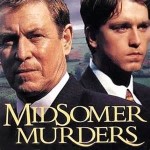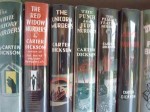I’ve got my own version of three dog night going tonight. It’s about 15 degrees outside, and an ice storm cometh. I’m on the sofa, with two dogs and two cats (2 cats=1 dog) snuggling so close it seems as if we are one entity.
Perfectly cozy.
 While flipping shows on Netflix, I settle upon one of my favorites – Midsomer Murders (If you like light mysteries and aren’t familiar with this show, you have missed out). Midsomer is one of those formulaic mysteries. There’s a murder (duh!) and while it’s being investigated, two more occur. Yes, there’s always three. The main character, a police detective, is visiting or passing through, (remind you of Jessica Fletcher? Yeah.) gets involved and solves the puzzle.
While flipping shows on Netflix, I settle upon one of my favorites – Midsomer Murders (If you like light mysteries and aren’t familiar with this show, you have missed out). Midsomer is one of those formulaic mysteries. There’s a murder (duh!) and while it’s being investigated, two more occur. Yes, there’s always three. The main character, a police detective, is visiting or passing through, (remind you of Jessica Fletcher? Yeah.) gets involved and solves the puzzle.
There are other mysteries that follow formulas. Columbo, that wonderful detective series, went by a strict formula. And Murder, She Wrote….we always said if Jessica showed up in our neighborhood, we were leaving. Murder followed her like a stray dog.
What about books? After all, we are all writers here, aren’t we? (but somebody wrote those scripts, remember?)
Books follow formulas, too.Those romances that have the cleavage and the abs on  the covers? Yup. One formula is the poor but beautiful young virgin meets handsome, rich guy who promises her the world. Oops! HE’s the BAD guy. Enter the shy, good-looking but overshadowed best friend. He’s the real hero. The challenge of each book is to find a new way for the hero to overcome his shyness and race to the maiden’s rescue.
the covers? Yup. One formula is the poor but beautiful young virgin meets handsome, rich guy who promises her the world. Oops! HE’s the BAD guy. Enter the shy, good-looking but overshadowed best friend. He’s the real hero. The challenge of each book is to find a new way for the hero to overcome his shyness and race to the maiden’s rescue.
Other authors – Sue Grafton, Janet Evanovitch , Dean Koontz, Clive Cussler, Dan Brown, Johnathan Kellerman, and even Steven King use formulas. Admittedly, some of them are more adept at variances, or adding twists and turns throughout so the basics are well hidden, but the formulas are there.
There’s nothing wrong with that. These and others are on Amazon’s 100 best selling mystery/ horror/ suspense writers list. And they got there because people buy their books.
You see, people have this desire to be entertained. But we also have this desire for regularity. We get that in formula writing. We know the author, know what kind of story he’s going to tell, and challenge him/her to keep us entertained without boring us. It’s a win-win on both sides.
Admittedly, not all of us write formulas. It’s hard for a one-or-two book writer to establish one. And some authors don’t have them at all. But it’s something to consider, whether you are working a series, center your books around the same hero, or perhaps, like Grisham or Crichton, a profession. Also, a formula writer can do something a little different, but we’d better know that up front. You just don’t mess around with your readership.
Your formula doesn’t have to involve plot. It can be that you always write about a certain type of character, or a certain crime, or an era - whatever. If you find your niche and get a group of readers on your side, congratulations.
Remember – If they like it, they’ll come back for more. Isn’t that what we all hope for?







Recent Comments